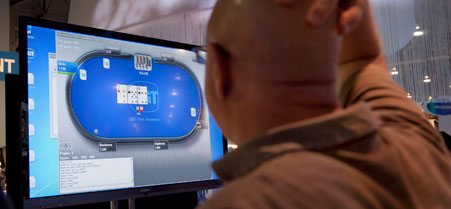Administration decision on Internet gambling may force Congress's hand
 Julie Jacobson/A
P
Julie Jacobson/A
P
A Justice Department memo last month that cleared the way for states to legalize online poker and lotteries makes it more important than ever for Congress to clear up the issue on a federal level, supporters of legislation say.
The Justice Department said the 1961 Wire Act, a federal law barring certain types of betting using wire communications, only applies to gambling on sporting events. The memo, which was written in September but not released until late last month, was crafted in response to questions from New York and Illinois about the legality of selling state lottery tickets online.
Supporters of legalizing online poker cheered the ruling but said it may create confusion and encourage the creation of a patchwork of state Internet gambling rules. Congress passed legislation in 2006 aimed at barring online gambling in the United States by prohibiting financial institutions from processing payments for online bets.
"I think that this ruling creates more confusion than clarity in the Internet gambling debate," American Gaming Association President and CEO Frank Fahrenkopf told National Journal in an interview.
Critics of the 2006 law say it has not prevented Americans from gambling online. Many Americans continue to gamble on websites based outside the United States, a situation that deprives U.S. players of consumer protections and state and federal governments of tax revenues, said John Pappas, executive director of the Poker Players Alliance. Pappas and others say Congress needs to step in with federal online poker legislation.
Both Pappas' group and the American Gaming Association favor legislation that would legalize and regulate online poker. Rep. Joe Barton , R-Texas, introduced a bill last year, though Fahrenkopf's group has not taken a formal stand on it. Supporters say poker is a game of skill and can be more easily regulated online than other forms of Internet gambling.
Barton said while the Justice memo makes clear that playing poke online does not violate the Wire Act, the department's interpretation of the law could lead states to adopt a variety of individual laws.
"If Congress doesn't act soon we could end up with fractured rules and regulations that vary state to state, leaving more opportunity for fraud and fewer safeguards for players," Barton, a senior member of the Energy and Commerce Committee, said in a statement. "I plan to keep moving forward with my efforts to move H.R. 2366 through the committee process, and I am confident it will be passed by the House and Senate - hopefully in this session."
Senate Majority Leader Harry Reid , D-Nev., also is reportedly working on online poker legislation and has been aiming to gain the support of Sen. Jon Kyl, R-Ariz., who helped craft the 2006 anti-gambling law, according to industry sources and news reports. Spokesmen for both Reid and Kyl did not respond to requests for comment.
The Energy and Commerce Subcommittee on Commerce, Manufacturing and Trade has held two hearings on Internet gambling and is likely to hold at least one more to gather additional feedback from the Justice Department and other officials on the issue. A spokesman for subcommittee Chairwoman Mary Bono Mack, R-Calif., said she has not made up her mind whether she will support Barton's bill, which must go through her panel.
NEXT STORY: Data Unleashed Against Cancer





